Yesterday, we had our final meeting with the Early Intervention (EI) evaluation and placement team. They recommended that Aerin meet with a developmental interventionist twice a week, and a speech therapist twice a month.
I became rather upset after this meeting. Not because they were saying Aerin is delayed and needs therapy (I have accepted this after the first meeting), but because their evaluation seemed inaccurate after further examination.
When I looked over the initial evaluation carefully (I hadn’t seen the scores they had assigned for each skill, and didn’t receive a copy of the full evaluation until last week), I noticed that they had scored Aerin lower than they should have. Now, I’m sure some of you are wondering if I’m being biased. But I recall our evaluation very well — it was only 3 weeks ago — and there are some skills they did not test her on, ask us about, or even mention, that they just marked as a “future learning objective.”
(The test was based on the Battelle Developmental Inventory, which consists of a checklist of milestones and skills. Each skill is to be categorized into one of three categories: mastered, emerging, and future learning objective.)
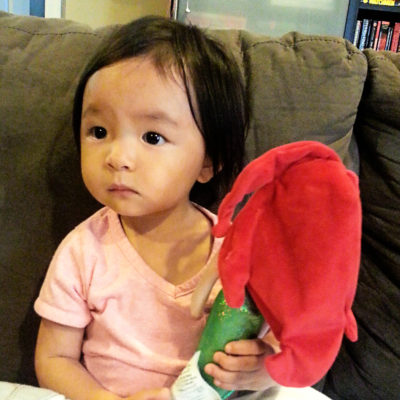
Aerin’s current favorite toy is this Ariel doll. She carries it around EVERYWHERE.
There were also some skills that I specifically remember our discussing, that they marked in a lower category. For example, they marked “Expresses ownership or possession” as a future learning objective when I thought we had declared it a mastered skill.
Additionally, there were times when it seemed like they wouldn’t take my word. When they asked if Aerin could identify herself in a mirror, I responded absolutely — she’s been doing this for a long time, and always runs to the closet door mirror whenever we put a new hair pin, hat, or clothes on her. But then they brought out a small, compact mirror and showed it to Aerin. She took a look, smiled at her reflection, and walked away. I saw that they had marked this skill as “emerging” when it was obvious to me that she prefers the large, bright mirror with which she’s familiar over a small mirror held by a stranger.
Some skills just seemed unfair, like how they scored Aerin low for not being able to walk up and down stairs by herself. She crawls up and down stairs because she’s little (under the 10th percentile for both height and weight) and her short legs make it practically impossible for her to walk!
Then there’s her vocabulary. When we did our initial evaluation, they asked me how many words Aerin knew, and I answered 10. They asked which words. Being put on the spot like like that, I could only recall 6 of those 10 words (I only started keeping a list after this meeting), and 6 was the the number they used in the final evaluation.
During our meeting yesterday, I told them that the number of words and 2-word phrases she knows has more than doubled since the evaluation (she knows more than 20 now). I went on to clarify that I only count a word/phrase if she regularly uses them, and I know for certain that she knows the meaning behind them….and they said that I should also count the ones she says once in a while too.
What? So not only was the first number they recorded incorrect, both numbers should definitely be higher too. But they didn’t seem concerned about this at all, and made no note of it.
A friend wondered if the EI evaluators had purposely scored Aerin lower so that she could qualify for more services (which isn’t necessarily a bad thing, and they may believe that every child needs all the help that they can get), and/or in order to help us qualify for insurance. I can certainly understand the first theory, but the second does not seem true, as they’re the ones who told us about the state’s family cost participation program, and went on to inform us that this would be more affordable for us than insurance.
And this is where my cynical, suspicious side comes in. I discovered that the state of New Jersey outsources its EI program. Meaning, they will ask outside parties to do the evaluations and therapy sessions, then reimburse them accordingly. So there’s a possibility that these companies intentionally score kids a bit lower so that they can make more money.
Am I being overly skeptical and paranoid? Perhaps.
J also questioned the accuracy of the first evaluation by pointing out that kids like Aerin, who are shy and weary of strangers, are naturally less likely to interact with people they don’t know well. Which is a valid point, especially seeing that they started the evaluation almost immediately after they walked through the door and it lasted only an hour. I remember that a few times during our evaluation, Aerin refused to do certain things I knew that she could do and does regularly. But when I pointed this out to the evaluators, they just smiled and marked the skill as “emerging” or “future learning objective” on their checklist.
Nonetheless, J and I have decided to go ahead with the therapy sessions. They can’t hurt (aside from our wallets), and I think interacting with other adults on a regular basis will help Aerin out of her shell. I also know that they can teach me a lot of things about child development too, and I would be grateful for the help.
Aerin has made tremendous progress in the past few weeks alone — not only has her vocabulary surged, but she’s also picking things up faster than ever, following directions, and more. Based on this alone, I can’t help but agree with J and my parents that she’s delayed (most likely due to her illness a few months back, because she was on track with everything before she got sick) but will catch up soon enough.
To be completely honest, my mommy instincts are telling me that she does not need therapy. But, like I said above, they can’t hurt. And if it turns out that my instincts were wrong, I will be glad to have given Aerin the extra help.
Right now my biggest concern is how I will juggle Claire’s preschool and Aerin’s therapy sessions, both of which will begin at about the same time. I guess I can see this as an early start to the years of extracurricular activities that lie ahead of us?
As for the possibility of autism, I am not too concerned about that anymore because of all the progress she’s made lately. Besides, both our pediatrician and the EI people told us that they prefer to test kids after they’re able to talk more. (And when I asked our doctor about the possibility of a long wait for a developmental pediatrician, he said his patients have never had to wait long after a referral.)
I should also mention that we have an appointment with a pediatric ENT physician this Friday. We want to get Aerin’s hearing checked by a specialist, just in case.

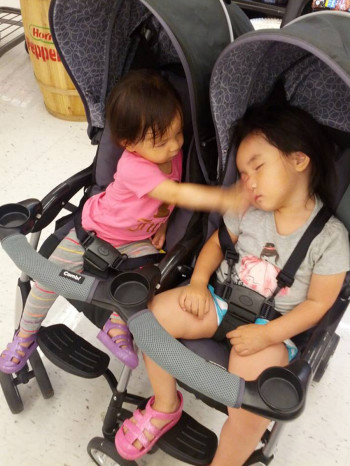
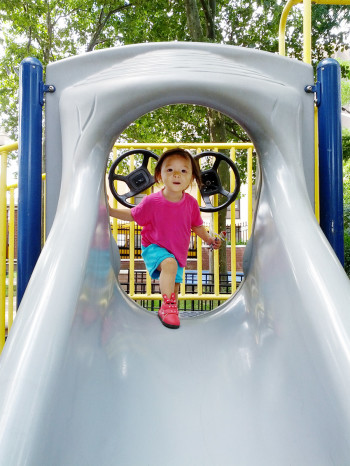
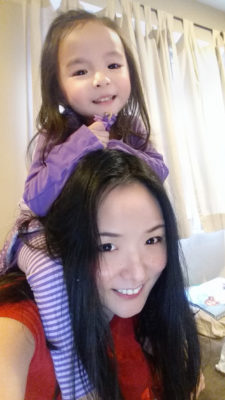
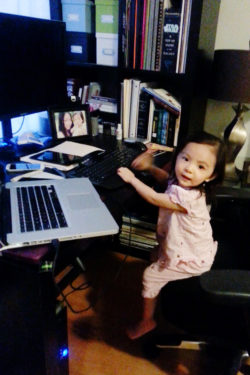
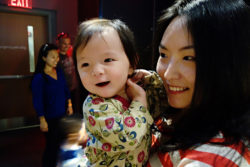


 I like books, gadgets, spicy food, and art. I dislike shopping, hot weather, and the laws of entropy. Although I am a self-proclaimed computer nerd, I still have a love for handbags and makeup... and I am always teetering on high heels. To learn more about me, visit the
I like books, gadgets, spicy food, and art. I dislike shopping, hot weather, and the laws of entropy. Although I am a self-proclaimed computer nerd, I still have a love for handbags and makeup... and I am always teetering on high heels. To learn more about me, visit the 
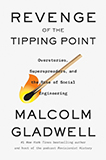

Woah woah woah, hold up. One of the milestones is walking up and down stairs ALONE?! Really? That seems insanely advanced for a not-quite-two year old! Perhaps small landscape stairs that are child sized, but not adult sized staircases. There is no way I could see that as a standard benchmark for that age. My girl Charlie will be two this Thursday, and she can technically walk up stairs if there is a handrail low enough, but she can’t walk down them. Nor would I let her at this age! At least not without hovering one step below. I think you’re doing a good thing by going with the therapy as a trial run, but I don’t think you are being paranoid. My sirens would be going off too after learning about the outsourcing. My child is also painfully shy, and refuses to engage with strangers at all until she’s had several hours to get used to them. I am confident she would score low on these tests too, simply by her personality, even though I’d have video evidence on my phone to prove she knows the skills. She just hates unfamiliar people and environments.
Anyway, I just wanted to offer some support and cheers for you for taking the hard steps to ensure your daughter’s success in life. It’s not easy to face in our society. Good luck on your journey!
I couldn’t believe it about the stairs either. It says on the report (and I quote): “She attempts to walk up stairs but goes down to place hands on steps to crawl as she is faster and prefers this way.”
I remember that I told them she can walk up stairs with assistance but crawls when she is by herself, and always crawls down because she is scared and her short legs can’t quite reach. And in response, they asked, “So would you say that she PREFERS to crawl rather than walk up and down stairs because it’s easier and faster?” Well, yes. Isn’t it obvious? But I didn’t think that they would interpret it as she’s behaving immaturely for her age and/or not challenging herself enough for doing this!
I also think that she probably would have scored a lot higher if she knew the testers or had more chance to become more comfortable with them. I know that they do these tests in the children’s homes to help the kids feel more comfortable, but it’s hard to say that they’re accurate when you consider that some kids are naturally shy and won’t open up to strangers.
And when they told me they prefer that she be more outgoing and initiate contact/play more? It reminds me of how our culture (unfairly) places an importance on being extroverted. I hope this way of thinking changes as our shy daughters grow older.
From my experience if you are not white, you aren’t ‘normal’ the majority of caucasians have defects (autism, skin cancer, etc) so in order to make it seem as if their race is just as normal as africans, asians(indians inclueded), and other non whites they give false reports to other races making it seem we have the same defects as them. When my son was 5 he was treated by a white american doctor stating that has autism. My mom who was in china told me to bring aiguo to china to get treated by a chinese doctor. When he got tested there were no signs of autism. I’m not a racist of white people jenny nor do I hate them. I’m just skeptic of their methods. My advice is that you should go to korea and see if you could get your daughter tested, and decide for yourself. And don’t forget you yourself know your child in and out you are the one who gave birth to this child not some. stranger who is making money by having you come in the office. Best of luck dear: -)
You sound like my mom! She’s always saying stuff like this for their growth measurement percentiles too. “I know she’s in the 10th percentile for her height compared to kids in the U.S., but what about compared to other Asian kids?”
I do, however, wonder if professionals would also keep pushing for more structured social activities if we were back in Korea. I’m not too sure about China (my husband is Chinese), but Korea is a society that values introversion over extroversion, which is the opposite of here.
I have to reply to this bc this comment angers me. I have a friend who works for EI in nj. She is in fact white and was called on by a CHINESE friend of mine bc she thought her son (who is older them my daughter) was developing much slower. My white unbiased friend who takes her job extremely seriously found NO problems w my friends son and sent them on their way.
She cares about these kids as if they are her own. She takes her job extremely serious. Her happiest moment is when they graduate from her services regardless of race. I’m disgusted that someone would think scores where rigged for different races. I would also think different countries have different standards for evaluation so taking a child outside of the country where they will be attending school would not be a wise move.
It’s no secret that children are overmedicated and diagnosed for corporate gain in the U.S. However, I have to disagree with you on your comment about how “the majority of caucasians have defects.” Even within my own family (Chinese on both sides, with no interracial marriages until my own) there are several cases of autism/other issues that would have been helped had they seen a doctor and were diagnosed early on. I think it is a fallacy that only white people have “defects”. It is very well known that mental health issues are taboo within Asian culture and thus they are ignored and neglected. So while the second opinion of the Chinese doctor is valid, it also does not invalidate the white doctor’s views; or, in this case, every white doctor’s views.
I would never, ever fly my child to China so they could be diagnosed by a doctor there. China’s level of corporate greed is only rivaled by the U.S. They are no better in their treatment of people with mental health issues; they certainly are no better in their healthcare system. I cannot even count the number of Chinese medicinal superstitions/rules/regulations imposed upon me when I became pregnant. Some gems include: “Don’t eat watermelon but drink bird’s nest/spit soup” and “You can’t bathe for a month after giving birth.” This is not sound medical advice but solid superstition/tradition.
For the record: No, my husband is not white and yes, I speak Chinese, eat Chinese food, was raised by my Toisan grandparents in Chinatown and hang out with lots and lots of Chinese people. I am not “white washed.” Both my PCP and OBGYN are Chinese women.
Like I had stated before I am not a racist. But you yourself know that everyone no matter their race deep down are prejudice it is just how we homo sapiens are created. We favor our race above all others so bringing my child to where he is around he’s own people who will not have discrimination of any sort will most likely give a correct report.
I really admire your outlook on this. We haven’t started trying for kids yet, but I can only imagine how outraged I would be at the inaccuracies in the testing and the potential for lower scoring to obtain more billable hours. I have to give you props for the attitude that “it won’t hurt anything, but just in case” even when your instincts are telling you it isn’t necessary. That covers all your bases!
I’m a school psych (in a different state, but that’s okay) and I will say, being devil’s advocate here, that there are very strict protocols regarding how these tests can be graded, meaning if we don’t see it ourselves we can’t say it happens; now, we can certainly write a note and put it in the report (which it seems like they should have done in this case if they haven’t), but because of the way the tests are standardized and written we have our hands tied there.
This is your kid, you know what’s best. We can only give recommendations based on what we see in the time that we’re given. If you see she’s really making tons of progress and aren’t as concerned, then make the best choice for your family regarding therapies. If you feel like this/these assessment/s was/were inaccurate, find a developmental company (or preschool) in your area and ask for another evaluation, making sure to give them a copy of the report from the other folks. If you feel like something’s fishy, you’re probably right. And NO evaluator should EVER grade a child lower just to get more services; this is not only unethical and wrong but it violates our code of ethics and should be reported to a supervisor.
Good luck, you’re doing great!
Thanks for taking the time to allowing me to see from the other perspective. I completely understand that evaluators are constrained due to time and resource limitations — I just wish there was a way to fairly evaluate a child, but I’m guessing there’s not.
I do want to clarify that the full evaluation report I received included their notes, and the reason I was upset is because while some of what they wrote was true to memory, not all of it was, or at least not how I was made to believe how they were scoring her.
I don’t think we will be getting another evaluation because she’s a shy kid who doesn’t open up to strangers well; I really do believe this aspect of her personality will always lead to lower scores (unless the evaluation is done by someone who she knows well, but that’s bound to be inaccurate too because that person may be biased). For me, what’s done is done and we can only try to make the best situation of what has already transpired. Again, thanks for your comment!
I have to totally agree with this comment. I’ve gone through the evaluation process EIGHT times (once initially for both kids through private therapy, once each for the early intervention, Liam has been re-evaluated for his IEP through the school, and yearly re-evaluations). The first one is the worst and most frustrating. You WANT to do all the tasks for them and it sometimes feels like the tester isn’t listening, but they do need to evaluate on observable behaviours and the kids have to “fail” a certain amount of tasks in a row. My daughter’s SLP even confided her frustration with the standardized test.
My oldest is really shy around strangers too and “failed” the test so badly, he ended up being in the 1st percentile. When he warmed up to the SLP, he immediately shot up in percentile and we revalued his goals. I say “we” because the SLP should definitely ask for you input when setting goals.
I understand your frustration because I’ve been there.
Thanks for the update! I don’t think you’re paranoid/suspicious/skeptical at all when you say that there may be a link between scores and money. In the health industry, money is ALWAYS a factor. However, I’m thinking they might adjust her therapy once they get to know her on a regular basis and eventually see what you know to be true. Additionally, do they charge more per session for higher needs children? As someone who works with many high needs children, I have encountered many parents who are in denial about their children’s needs or are woefully inaccurate about their child’s abilities. NOT to say you fall into any of these categories, but it seems that these evaluators may have seen their share of this so their practices may reflect that.
You and J are champs and amazing parents; for this reason alone, Aerin’s future will be very bright. Unfortunately, not every child has one, let alone two, loving parents who advocate and fight for their child to have the best.
Ooh yes. We know that our being her parents may very well be clouding our judgement on this, and that’s why we want to go ahead with therapy although our instincts tell us otherwise.
They don’t charge more per session for higher needs children, but they do charge per hour. A couple of meetings back, I asked how many sessions we can expect, and they said the average is 3-5x a week. So we seem to be on the lower end already, and if they decide to lower that number, all the better.
Oops I also meant to say, they charge per hour and the more help a child needs, the more hourly sessions he or she will receive.
It sounds like you’ve really found a good place to be about all this–doing the therapy for Aerin but not letting it make you worry or feel terrible like it sounded it did when they first evaluated her. I think you’re thinking about it just right. I’m glad that, now that you have a little distance from it, you’re able to look a little more objectively about the evaluation and take it as a data point but still decide for yourself how well she’s doing at each different thing, and that’s the important thing! You’re the only one who can advocate for her to get help, and you’ll also be the only one to advocate for her in the future if you think she’s getting an inaccurate label because of her development schedule. I’m so glad to read this post because you sound much better than before.
Also, look at that sweet little face!!! I love it when my daughter gets that look on her face.
I would not take offense to the assessment. Like one person proposed, it maybe to get more services (although in accurate assessments to get more services which the outsourced outfit then profits from-well, that’s just wrong). Generally you don’t bill more for an evaluation based on the diagnosis you make (like how delayed the kid is, or how sick the person is) BUT you can bill for how long you spend doing the evaluation, so if the evaluator spends more time doing the eval of a more delayed kid, well, maybe they make a little bit more (this is doubtful, it’s probably a bundled DRG payment or a capitated system)
Anyways, I reading a bit on an MD forum site and child psych and behaviorial peds also have witnessed momentous increased incidence of dx of PDD and some kids “outgrowing” their diagnoses. I think your mother instincts are generally good but more care early on is fine unless an IEP (which she maybe too young for right now) pulls her out of regular socialization in classes or the burden of this extra care gets to be too much for your family from a time, energy, or cost standpoint.
I’m glad to hear she’s doing better!
I’m so glad to read that you’re getting her hearing tested too! When I was starting school my teachers thought I was delayed too. Nope, just practically blind in one eye. Once I got glasses between first and second grade I went from needing pull-out help for reading and writing to pull-out GT enrichment classes and devoured books from the library as often as I could get there. Before that I had apparently been content to just sit around and stare into space (I’ve never been into sports) and listen to everything that’s going on around me. I remember not being able to play 4-Square because I couldn’t see the chalk lines on the sidewalk. HOORAY FOR GLASSES, now I can see what everyone else sees!